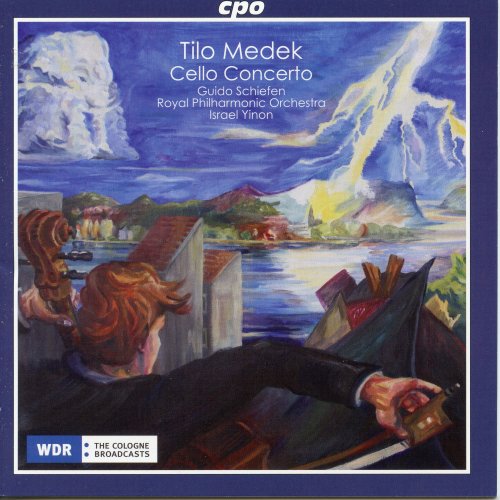
Guido Schiefen, Royal Philharmonic Orchestra, Israel Yinon - Medek: Cello Concerto No. 1, Eine Stele für Bernd Alois Zimmermann & Schattenspiele (2010)
BAND/ARTIST: Guido Schiefen, Royal Philharmonic Orchestra, Israel Yinon
- Title: Medek: Cello Concerto No. 1, Eine Stele für Bernd Alois Zimmermann & Schattenspiele
- Year Of Release: 2010
- Label: CPO
- Genre: Classical
- Quality: flac lossless (tracks)
- Total Time: 01:00:09
- Total Size: 262 mb
- WebSite: Album Preview
Tracklist
01. Cello Concerto No. 1: I. Auftürmung (Live)
02. Cello Concerto No. 1: II. Gassenhauer (Live)
03. Cello Concerto No. 1: III. Und dann und wann ein weißer Elefant (Live)
04. Cello Concerto No. 1: IV. Wie ein Blitz aus heiterem Himmel (Live)
05. Eine Stele für Bernd Alois Zimmermann
06. Schattenspiele: I. —
07. Schattenspiele: II. —
08. Schattenspiele: III. —
09. Schattenspiele: IV. —
10. Schattenspiele: V. —
Born in Germany at a tumultuous time in the country's history, composer Tilo Medek was also a man at war with the prevailing musical ideology of his time. Though the avant-garde and movements like serialism and electronic music were becoming increasingly popular, Medek was, at his heart, more of a traditionalist. Though his unique harmonic language still broke new ground, he avoided clearly programmatic music, instead taking a middle ground between purely programmatic and absolute music. This CPO album features Medek's First Cello Concerto (1978-1982); as well as Eine Stele (1976), dedicated to his friend Bernd Zimmermann; and Schattenspiele (1973), both for solo cello. All three works make exceptional technical and endurance demands on the cellist. The concerto almost pits the solo cello against the vast orchestra, at times even calling upon the orchestra to completely overtake the fledgling soloist. Performing these three works is cellist Guido Schiefen. The two works for solo cello are by far the most accessible works on the disc and yield the most appealing overall sound quality. Schiefen's playing is technically superb here, his sound is powerful and penetrating yet rounded and inviting. His use of a vast array of tone colors draws listeners into the story he is telling with his instrument. Perhaps because of the antagonism between soloist and orchestra, Schiefen's sound in the concerto is much more strained and strident, not nearly as appealing as before.
01. Cello Concerto No. 1: I. Auftürmung (Live)
02. Cello Concerto No. 1: II. Gassenhauer (Live)
03. Cello Concerto No. 1: III. Und dann und wann ein weißer Elefant (Live)
04. Cello Concerto No. 1: IV. Wie ein Blitz aus heiterem Himmel (Live)
05. Eine Stele für Bernd Alois Zimmermann
06. Schattenspiele: I. —
07. Schattenspiele: II. —
08. Schattenspiele: III. —
09. Schattenspiele: IV. —
10. Schattenspiele: V. —
Born in Germany at a tumultuous time in the country's history, composer Tilo Medek was also a man at war with the prevailing musical ideology of his time. Though the avant-garde and movements like serialism and electronic music were becoming increasingly popular, Medek was, at his heart, more of a traditionalist. Though his unique harmonic language still broke new ground, he avoided clearly programmatic music, instead taking a middle ground between purely programmatic and absolute music. This CPO album features Medek's First Cello Concerto (1978-1982); as well as Eine Stele (1976), dedicated to his friend Bernd Zimmermann; and Schattenspiele (1973), both for solo cello. All three works make exceptional technical and endurance demands on the cellist. The concerto almost pits the solo cello against the vast orchestra, at times even calling upon the orchestra to completely overtake the fledgling soloist. Performing these three works is cellist Guido Schiefen. The two works for solo cello are by far the most accessible works on the disc and yield the most appealing overall sound quality. Schiefen's playing is technically superb here, his sound is powerful and penetrating yet rounded and inviting. His use of a vast array of tone colors draws listeners into the story he is telling with his instrument. Perhaps because of the antagonism between soloist and orchestra, Schiefen's sound in the concerto is much more strained and strident, not nearly as appealing as before.
As a ISRA.CLOUD's PREMIUM member you will have the following benefits:
- Unlimited high speed downloads
- Download directly without waiting time
- Unlimited parallel downloads
- Support for download accelerators
- No advertising
- Resume broken downloads


